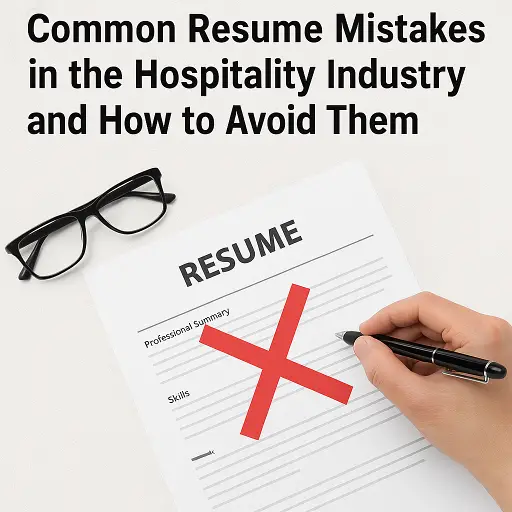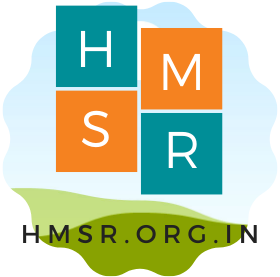In the fast-moving world of hospitality, your resume often determines whether you move forward or get filtered out. Unfortunately, resume mistakes in the hospitality industry are more common than many realize — and they can cost even talented candidates interviews, especially in high-traffic roles like front office, housekeeping management, F&B service, and guest relations.
🎯 Why Resume Perfection Matters in Hospitality

The hospitality industry thrives on first impressions — and your resume is the very first. HR managers and recruiters look for clarity, relevance, attention to detail, and personality in your profile. Read this for more details on What Recruiters Want to See. Unfortunately, resume mistakes in the hospitality industry are surprisingly common, often due to a lack of industry-specific guidance. Let’s break down the Resume Mistakes in the Hospitality Industry and how to avoid them.
This article identifies the most damaging resume mistakes in the hospitality industry, explains how and why they hurt your chances, and offers specific tips to help you stand out in the job market.
Table of Contents
- 🎯 Why Resume Perfection Matters in Hospitality
- 10 Resume Mistakes in the Hospitality Industry
- ❌ Mistake #1: Including Irrelevant or Unfocused Work Experience
- ❌ Mistake #2: Writing a Vague or Generic Objective
- ❌ Mistake #3: Ignoring Keywords from Job Descriptions
- ❌ Mistake #4: Listing Responsibilities Instead of Achievements
- ❌ Mistake #5: Failing to Highlight Soft Skills
- ❌ Mistake #6: Using Poor Formatting and Design
- ❌ Mistake #7: Typos and Grammar Errors
- ❌ Mistake #8: Sending a One-Size-Fits-All
- ❌ Mistake #9: Leaving Out Certifications and Technical Skills
- ❌ Mistake #10: Omitting Language Skills or International Exposure
- ✨ Additional Tips to Strengthen Your Resume
- 📌 Final Checklist: How to Avoid Resume Mistakes in the Hospitality Industry
- 🧭 Final Thoughts
- In this article
10 Resume Mistakes in the Hospitality Industry
❌ Mistake #1: Including Irrelevant or Unfocused Work Experience
Many candidates, especially freshers or career switchers, list every job they’ve ever done — including roles that have little or no connection to hospitality. This is one of the most frequent resume mistakes in the hospitality industry. It gives hiring managers extra work to sift through unrelated content, and worse, it dilutes your focus.
✅ How to Avoid It:
Prioritize roles that demonstrate customer service, teamwork, communication, or multitasking. Even if your last job wasn’t in a hotel, draw connections to hospitality traits.
Example:
Instead of just listing “Sales Associate – Retail,” explain how the experience relates:
“Assisted over 150 customers daily in a high-pressure retail environment, honing interpersonal and upselling skills relevant to front desk and concierge roles.”
❌ Mistake #2: Writing a Vague or Generic Objective
Another major resume mistake in the hospitality industry is starting with an uninspired objective like, “Looking for a challenging position in a reputed company.” It says nothing about you or your passion for hospitality and could apply to any industry.
✅ How to Avoid It:
Use a concise summary or objective that highlights your specific strengths and aligns with the company’s values.
Better:
“Detail-oriented hotel management graduate with hands-on experience in guest relations and POS systems, seeking to deliver exceptional service in a dynamic resort environment.”
❌ Mistake #3: Ignoring Keywords from Job Descriptions
Many resumes never make it past ATS (Applicant Tracking Systems) because they don’t include hospitality-specific keywords. Ignoring this is one of the most damaging resume mistakes in the hospitality industry in the digital hiring age.
✅ How to Avoid It:
Read the job posting carefully. Use exact phrases like:
- “Front desk operations”
- “Reservation management”
- “Guest satisfaction”
- “Inventory control”
- “Housekeeping coordination”
Mirroring the employer’s language boosts both human and algorithmic visibility.
❌ Mistake #4: Listing Responsibilities Instead of Achievements
Many candidates make the classic resume mistake in the hospitality industry of simply listing what they were supposed to do — not what they actually accomplished.
✅ How to Avoid It:
Frame your experience in terms of results, not just duties. Use action verbs and metrics where possible.
Weak:
“Responsible for handling customer check-ins and check-outs.”
Stronger:
“Handled daily check-ins/check-outs for 80+ guests, improving satisfaction score by 15% over two quarters.”
❌ Mistake #5: Failing to Highlight Soft Skills
Hospitality is a people-driven industry. Leaving out your soft skills is one of the most overlooked resume mistakes in the hospitality industry, especially among technically trained candidates.
✅ How to Avoid It:
Mention soft skills like communication, empathy, adaptability, and cultural sensitivity in context.
Example:
“Collaborated with international teams to coordinate events for guests from over 10 nationalities, demonstrating cultural awareness and adaptability.”
❌ Mistake #6: Using Poor Formatting and Design
A cluttered layout, inconsistent fonts, or unreadable resume will turn off recruiters — especially in an industry where presentation and clarity matter. This visual oversight is a surprisingly common resume mistake in the hospitality industry.
✅ How to Avoid It:
Stick to a modern, clean layout. Use no more than 1–2 fonts. Prioritize clarity, with bold headers and bullet points. Avoid excessive colors or design elements unless you’re in a creative role like hospitality marketing.
❌ Mistake #7: Typos and Grammar Errors
Nothing screams unprofessional louder than a typo in your resume — yet it remains one of the most avoidable resume mistakes in the hospitality industry. In an environment where attention to detail is key (e.g., food allergies, room requests), errors raise red flags.
✅ How to Avoid It:
Proofread, then proofread again. Use tools like Grammarly. Ask a friend, mentor, or placement officer to double-check your resume before sending it out.
❌ Mistake #8: Sending a One-Size-Fits-All
ResumeSending the exact same resume to every hotel, airline, or restaurant chain is a lazy — and ineffective — job search strategy. This lack of customization is one of the worst resume mistakes in the hospitality industry.
✅ How to Avoid It:
Tailor your resume to each employer. Research the company, understand their brand voice, and adjust your resume summary and experience highlights accordingly.
For example, emphasize luxury experience when applying to a 5-star hotel, or eco-tourism values if applying to a sustainable resort brand.
❌ Mistake #9: Leaving Out Certifications and Technical Skills
The modern hospitality landscape relies heavily on software and compliance training. Failing to showcase these skills is another major resume mistake in the hospitality industry, especially for those applying to front desk or back-end operations roles.
✅ How to Avoid It:
Add a “Certifications & Systems” section listing:
- Property Management Systems (PMS) like OPERA, IDS, or Cloudbeds
- HACCP or Food Safety Training
- Microsoft Office Suite or Google Workspace
This adds credibility and demonstrates job-readiness.
❌ Mistake #10: Omitting Language Skills or International Exposure
With hospitality being one of the most global industries, your ability to interact across cultures is a valuable asset. Ignoring this is another subtle but costly resume mistake in the hospitality industry.
✅ How to Avoid It:
Add a “Languages” section with proficiency levels (Fluent, Conversational, Basic). If you’ve worked or studied abroad, include that experience.
Example:
“Fluent in English and French; assisted international guests at Marriott Paris during summer internship.”
✨ Additional Tips to Strengthen Your Resume
Now that we’ve tackled the top resume mistakes in the hospitality industry, here are a few bonus tips to boost your chances:
- Keep your resume to one page (for freshers) or two pages max (for experienced professionals).
- Always include your LinkedIn URL if it’s updated and professional.
- Mention volunteer work at hospitality events, university fests, or tourism expos.
- Include a small section on interests or hobbies — especially those that connect to service, travel, food, or leadership.
📌 Final Checklist: How to Avoid Resume Mistakes in the Hospitality Industry
To help you build a winning resume, here’s a quick checklist:
✅ Focus on relevant and impactful experience
✅ Use job-specific keywords
✅ Show achievements, not just duties
✅ Highlight soft skills and certifications
✅ Format for clarity and readability
✅ Proofread for grammar and typos
✅ Tailor each resume to the job
✅ Don’t forget languages and cultural exposure
Avoiding resume mistakes in the hospitality industry doesn’t require perfection — it requires intention. Think like a hotelier: present yourself professionally, anticipate your reader’s expectations, and serve up your resume like it’s your best guest experience yet.
🧭 Final Thoughts
Avoiding resume mistakes in the hospitality industry isn’t just about perfect grammar or formatting. It’s about understanding what recruiters value in a candidate — warmth, attention to detail, adaptability, and professionalism.
Your resume is your calling card in a world where service excellence is the ultimate currency. By avoiding these common resume mistakes in the hospitality industry, you’re not just increasing your chances of landing an interview — you’re proving that you already think and act like a hospitality professional.



[…] 10 Resume Mistakes in the Hospitality Industry and How to Avoid Them […]